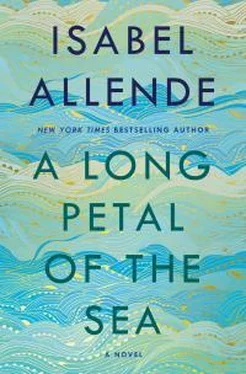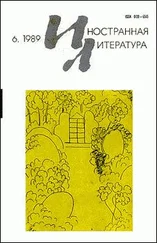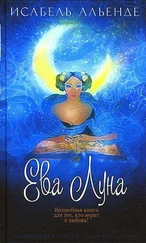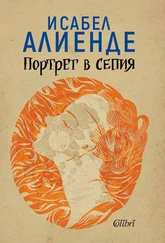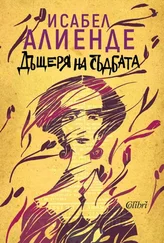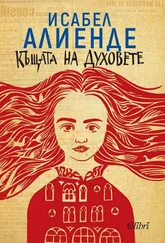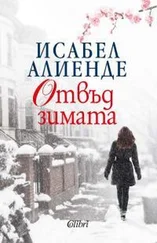“Dear Jesus! What’s happened to you, for God’s sake!” exclaimed Roser on the front doorstep, her Catholic upbringing resurfacing. Guillem didn’t respond: his head was drooping on his chest, his legs unable to support him. Then Carme also appeared from the kitchen, and her terrified cry rose from her feet to her throat, producing an outburst of coughing.
“Stay calm, comrades. He’s not wounded; he’s sick,” one of the militiawomen said firmly.
“This way,” Roser directed, leading them to the room that had once been Guillem’s and which she now occupied. The two women laid him down on the bed and withdrew, only to return a minute later with his rucksack, blanket, and rifle. Then they left, after bidding the family a brief goodbye and good luck. Carme was still coughing desperately, so Roser took off Guillem’s tattered boots and filthy socks, struggling to control the nausea she felt at his stinking body. There was no way they could take him to a hospital, where he would only get infected, or try to find a doctor—doctors were all far too busy with the war wounded.
“We have to wash him, Carme, he’s filthy. I’ll run to the telephone exchange to call Victor,” said the girl, who didn’t want to see Guillem naked, covered in excrement and urine. On the telephone Roser explained the symptoms to Victor: a very high fever, difficulty breathing, diarrhea.
“He groans whenever we touch him. He must be in a lot of pain, in the stomach I think, but the rest of the body as well. You know your brother never complains.”
“It’s typhus, Roser. There’s an epidemic of it among the soldiers. It’s transmitted by lice, fleas, contaminated water, and dirt. I’ll try to come and see him tomorrow, but it’s very hard for me to leave my post. The hospital is full to overflowing—every day we receive dozens of newly wounded people. For now you need to give him boiled water with a little sugar and salt to drink to keep him hydrated, and wrap him in cold damp towels to lower the fever.”
For the next two weeks, Guillem Dalmau was looked after by his mother and Roser, supervised from Manresa by his brother, whom Roser called every day to report on Guillem and receive instructions on how to avoid contagion. They had to get rid of the lice in his clothes—the best way was to burn them—to wash everything with bleach, use different cooking pots for Guillem, and to wash their own hands thoroughly each time they attended him. The first three days were critical. Guillem’s temperature rose to 104 degrees; he was delirious, beside himself with headaches and nausea, his body racked with a dry cough; his feces were a green liquid like pea soup. On the fourth day, his fever abated, but they couldn’t wake him. Victor told them to shake him and force him to drink water, but to let him sleep the rest of the time. He needed to rest and recover.
The main responsibility for looking after him fell on Roser, because Carme, due to her age and the state of her lungs, was more vulnerable to catching the disease. While Roser spent the day at home, reading or knitting beside Guillem’s bed, Carme continued to go out to teach and stand in line for food. Roser went on with her night job, because she was paid with bread. Rations of lentils had been reduced to half a cup per person per day; there were no cats or pigeons left for stews. Roser’s bread was a dark, heavy block that smelled of sawdust; oil had become a luxury item, and was mixed with engine oil to make it go further. Many people grew vegetables in their bathtubs or on their balconies. Family heirlooms and jewels were traded for potatoes and rice.
Although Roser didn’t see her family, she had stayed in touch with a few peasants in the countryside, and so could get vegetables, a piece of goat cheese, a sausage on the rare occasions a pig was killed. Carme’s budget didn’t allow her to buy on the black market, where there were very few foodstuffs, but which was a last resort for cigarettes and soap. Guillem was as skinny as a skeleton, and they had to help him regain his strength, so Carme dipped into the little savings her husband had left and sent Roser back to Santa Fe to buy anything they could put in a soup. She knew Marcel Lluis had intended the money to be used to send the family out of Spain, but the fact was that none of them could seriously consider emigrating. What would they do in France or anywhere else? They couldn’t leave their home, their neighborhood, their language, their relatives and friends. The possibility that they would win the war was increasingly remote, and they had silently resigned themselves to a negotiated peace and Nationalist repression, but even that was preferable to exile. However ruthless Franco was, he couldn’t execute the entire Catalan population.
Roser spent the money on two live chickens. She traveled with them hidden in a sack tied around her waist under her dress so that they wouldn’t be stolen by some desperate person or confiscated by soldiers. Thinking she must be pregnant, the other passengers gave up their seat for her on the bus. She sat there covering the bulge as best she could, praying the birds didn’t start moving around. Carme covered the floor of one of the rooms with sheets of newspaper and they installed the chickens there. They fed them with scraps and leftovers from the Rocinante bar, as well as a little barley and buckwheat Roser smuggled out of the bakery. The birds recovered from the trauma of being in the sack, and soon Guillem could count on one or two eggs for breakfast.
After a few days’ convalescence, their patient wanted to return to life, but had barely enough energy to sit up in bed and listen to Roser play the piano in the living room or read detective novels out loud to him. He had never been much of a reader: as a boy he got through school thanks to his mother, who supervised his homework, and to Victor, who often did it for him. At the front in Madrid, where he found himself growing bored in endless waits while nothing happened, it would have been wonderful to have Roser read to him. There were more than enough books, but to him the words seemed to dance all over the page. During pauses in her reading, he told Roser about his life as a soldier, about the volunteers from more than fifty countries who had come to Spain to fight and die in a war that wasn’t theirs, about the Americans in the Lincoln Brigade who were always in the vanguard, and always the first to fall. “They say that more than thirty-five thousand men and several hundred women from other countries came to fight against Fascism. That’s how important our war is, Roser.” He told her about how the corridors of the buildings were full of rubble, garbage, dust, and broken glass. “In the quiet moments we teach and we learn. Mother would be in her element teaching the boys who can’t read or write; lots of them have never been to school.”
What he didn’t mention to Roser were the rats and lice, the feces, urine, and blood, the wounded comrades waiting hours losing blood until the stretcher-bearers could reach them, the hunger and mess tins with hard beans and cold coffee, how some comrades were irrationally brave and faced the bullets nonchalantly, whereas others were terrified, especially the youngest, the newest arrivals, the boys in the Baby Bottle Conscription. Fortunately, he had not had to fight alongside any of them because he would have died of pity. Much less did he confess to Roser the mass executions carried out by his own comrades: how they tied enemy prisoners together in pairs, took them off in a truck to some waste ground, shot them on the spot, and then buried them in mass graves. More than two thousand in Madrid alone.
—
IT WAS THE START of summer. Night fell later, and the days grew longer in hot, languid hours. Guillem and Roser spent so much time together they came to know each other very well. However much they shared reading or conversing, there were lengthy silences steeped in a sweet feeling of intimacy. After supper, Roser would lie down on the bed she now shared with Carme and sleep until three in the morning. Then she would set off for the bakery to prepare the bread that was handed out as rations at first light.
Читать дальше
